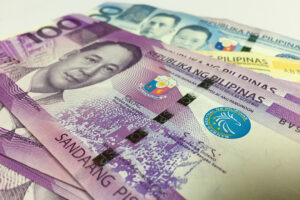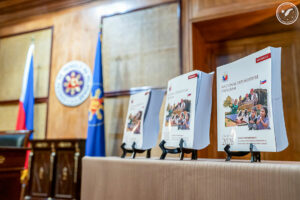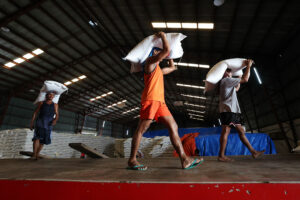When President Ferdinand Marcos, Jr. sits down with US President Donald Trump in Washington, DC this week, he brings a test case for the entire Indo‑Pacific region. From Sydney to Seoul, capitals are wrestling with the same puzzle: how to keep US security guarantees intact while avoiding the heavy new tariffs the White House has aimed at almost everyone. The Philippines, bound to Washington by a 73‑year‑old Mutual Defense Treaty (MDT) and desperate to shield its exporters from a looming 20% duty, is about to find out whether guns can really buy butter.
The early evidence is not encouraging. After a hundred days of shuttle diplomacy, Japan still faces a blanket 25% tariff that is set to kick in on Aug. 1 unless eleventh‑hour talks succeed. Tokyo’s chief negotiator, Ryosei Akazawa, heads back to Washington next week, but officials privately concede the alliance has provided “no automatic rebate at the customs window”1. South Korea, home to nearly 30,000 US troops, lost an earlier exemption in February and is staring at the same surcharge2. Even the European Union has been threatened with a 30% levy for failing to strike a broader trade deal3. If military alliances alone could buy relief, these negotiations would have ended differently.
Australia illustrates the broader dilemma. Canberra lifted $20 billion in Chinese trade barriers last year while doubling down on the AUKUS submarine pact with Washington; it still faces the baseline 10% US tariff that entered force in April, and officials warn a higher tranche could follow if talks stall4. Prime Minister Anthony Albanese’s July visit to Beijing drew criticism at home for yielding few hard concessions, yet business leaders insist the trip was necessary hedge‑building in an era when neither ally nor market can be taken for granted5. That logic now frames Manila’s own gambit.
Yet Philippine diplomats still hope the MDT can tip the scales. Under the Enhanced Defense Cooperation Agreement, Washington already enjoys access to nine Philippine bases, several within missile range of contested South China Sea features. The United States has just announced a major upgrade of one logistics hub to help sustain resupply missions to Second Thomas Shoal6. If these facilities matter so much to US strategy, the argument runs, surely tariff relief should follow naturally.
But guns rarely trump spreadsheets in Trump‑era bargaining. Tokyo’s failure shows why. Japanese negotiators offered expanded market access for US beef and digital‑trade guarantees yet discovered that the White House values optics — cuts to the bilateral deficit — more than alliance rituals7. South Korea’s fate is similar: its security role against North Korea won no tariff waiver once the administration decided Korean electric‑vehicle exports undercut “American jobs”8. The takeaway for Manila is stark: the MDT is not a magic key, only one bargaining chip.
First, the Philippines must separate — but carefully sequence — security and trade. Marcos should lock down a fresh public statement on the MDT and base upgrades before shifting to tariffs. Framed this way, customs relief becomes a logical complement to a partnership Washington already says it needs. Treating tariffs as a price tag on sovereignty, by contrast, risks congressional blowback and domestic anger in Manila.
Second, the government should arrive with a compliance regime in hand. Vietnam’s near‑miss offers the template. Hanoi persuaded Trump to cut a threatened 46% tariff to 20%, but only after conceding strict origin‑tracing rules — and even now exporters complain the annexes remain so vague that banks hesitate to finance shipments9. Marcos can avoid that limbo by tabling, on day one, a “trusted‑exporter” program: digital certificates, third‑party factory audits and a real‑time hotline for US Customs. Any tariff waiver would then snap back automatically if rules are broken. Investors in Cavite and Clark care more about certainty than grace.
Third, Jakarta’s recent success shows the power of hard assets. Indonesia leveraged nickel, copper, and Boeing purchases to cut its threatened tariff from 32% to 19% while promising lower duties on US exports10. The Philippines can assemble a similar bundle: nickel ore from Surigao, copper concentrates from Tampakan, and a rapidly growing renewable‑energy sector that needs US turbines. Bundled with a vow to admit more American farm goods, that package gives Trump a jobs narrative that transcends security talking points.
Fourth, Manila must mind the home front. Chinese Coast Guard water‑cannons near Scarborough and Second Thomas Shoals have hardened public opinion. If voters perceive that tariff concessions were bought at the expense of firmer US deterrence, the political backlash could undo years of alliance rebuilding. That danger argues for sequencing: security first, tariffs second, with neither overtly traded for the other.
Fifth, review clauses are essential. Japan’s stalled talks demonstrate how oral assurances evaporate when enforcement disputes arise. Manila should insist on quarterly consultations and a 60‑day cure window before higher duties can snap back, giving exporters — and Wall Street lenders — predictability.
Playing the MDT card also forces the Philippines to confront its peculiar geography. Manila depends on China for roughly $41 billion in annual trade and on Washington for the patrols that keep those sea lanes open. Balancing the two is no longer abstract theory; it determines factory shifts, peso exchange rates, and, potentially, national security.
The broader Indo‑Pacific debate now turns on a single question: can any country maintain deep economic ties with China while relying on the US security umbrella? Japan, South Korea, and Australia have tried, each with mixed results. ASEAN has pushed “open regionalism,” signing the world’s largest trade pact with China (the Regional Comprehensive Economic Partnership or RCEP) even as individual members expand defense drills with the United States. The Philippines is simply the latest, most vivid illustration of that tightrope.
None of this guarantees success. Analysts warn that even a best‑case deal may only trim Manila’s tariff rate to 10%, enough to keep some export lines profitable but hardly a free pass11. Trump’s tariff playbook is an all‑purpose lever; the goalposts can move with a single tweet. Still, rejecting the MDT card entirely would leave Manila playing defense on two flanks: tariff hikes on one side, Chinese pressure on the other.
Success therefore lies in disciplined hedging. Firm up the alliance without commodifying it. Offer market access and critical minerals that speak to American voters. Arrive with enforceable traceability to calm US sceptics. And weave in review clauses that protect Philippine businesses when the political winds shift.
If Marcos can pull off that choreography, Manila will show smaller Indo‑Pacific states that the security‑trade trade‑off is not zero‑sum. Australia, still angling for its own tariff waiver even as it deepens ties with Beijing, will take note. So will Japan and South Korea, whose disappointment on tariffs may become leverage in their next negotiating round. ASEAN neighbors, eyeing the same shoals of economic dependence and security need, will watch just as closely.
The stakes could hardly be higher. A mis‑step could sour US sentiment, invite more Chinese pressure, and rattle foreign investors already wary of supply‑chain rerouting. A deft bargain, by contrast, could lock in lower tariffs for Philippine exporters, reinforce deterrence in the South China Sea and — perhaps — offer a blueprint for other middle powers caught between the two superpowers.
Marcos therefore walks into the Oval Office carrying more than his own country’s fortunes. He represents a region searching for a viable path between economic gravity and security necessity. The MDT may not be the trump card many once imagined, but if played with care — sequenced, backed by concrete offers, anchored in domestic legitimacy — it could still help Manila defuse the tariff time‑bomb and show the Indo‑Pacific how to keep both trade routes and treaty lines open.
1 https://tinyurl.com/28a69vcr
2 https://tinyurl.com/2bltp5by
3 https://tinyurl.com/2xkxtqgc
4 https://tinyurl.com/22qj99oe
5 https://tinyurl.com/2ysobufq
6 https://tinyurl.com/2abzqp49
7 https://tinyurl.com/28a69vcr
8 https://tinyurl.com/2bltp5by
9 https://tinyurl.com/26bc7llp
10 https://tinyurl.com/2cnsdckr
11 https://tinyurl.com/2dysqk69
Eduardo Araral, PhD is an associate professor at the Lee Kuan Yew School of Public Policy, National University of Singapore. This op-ed is written in his personal capacity.






